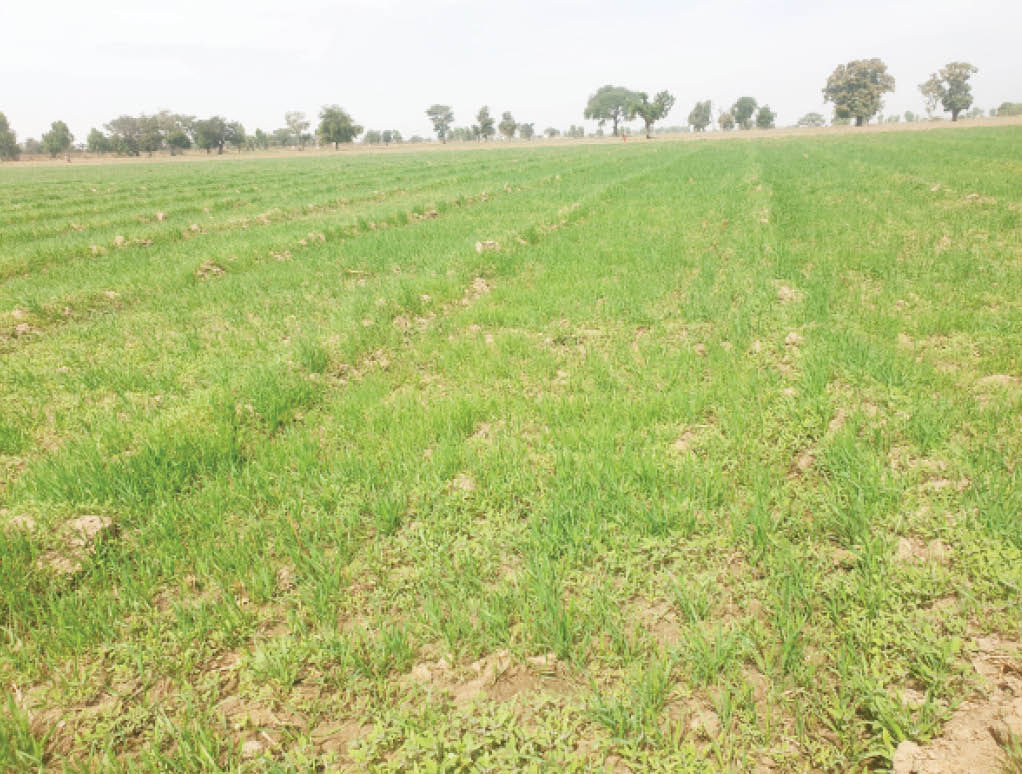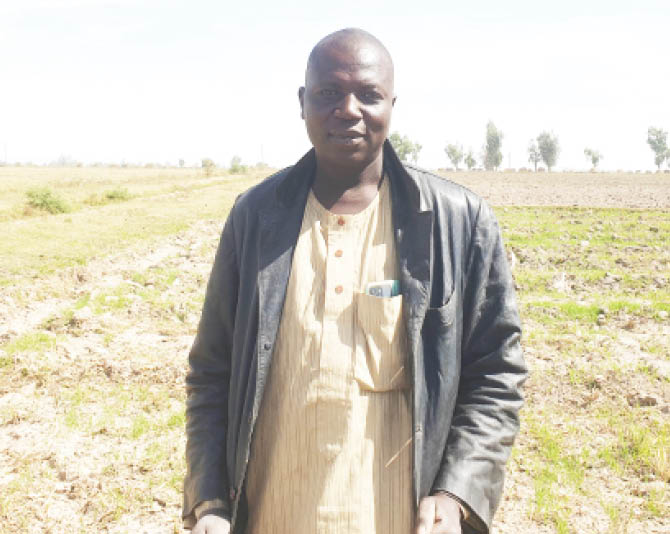Kano wheat farmers hopeful amid inputs prices’ hike
As dry season farming is intensifying in Kano and other parts of the North, wheat farmers in the state are hopeful of a bumper harvest despite the high costs of fertiliser, seeds and other inputs as the farmers have planted vast farmlands with varieties of wheat. Daily Trust on Sunday gathered that the farmers, with […]

One of the wheat farms
As dry season farming is intensifying in Kano and other parts of the North, wheat farmers in the state are hopeful of a bumper harvest despite the high costs of fertiliser, seeds and other inputs as the farmers have planted vast farmlands with varieties of wheat.
Daily Trust on Sunday gathered that the farmers, with the hope to recover the losses of the last dry season when irrigation was stalled due to the repair of dams, have delved into wheat farming more than before when the crop was abandoned for some reasons.
It was also gathered that many farmers who were not into wheat farming have joined the trend; all in the quest to benefit from the transformation of the agricultural sector in the state.
According to statistics, the global scarcity of wheat is caused by the Russian-Ukraine war and the lack of foreign exchange. The price of wheat has risen by almost 50 per cent since the start of 2022, and its importation has fallen by 16.09 per cent.

According to a data from the National Bureau of Statistics (NBS), the total importation of wheat into Nigeria was N753.59bn in the first three quarters of 2022, which is a N144.59bn fall from the N898.19bn it was in the corresponding period of 2021. The importation of wheat crashed by 16.09 per cent year-on-year in the first nine months of 2022.
Flour which is made from wheat is essential in the production of pasta, bread, noodles and other food items. Therefore, the fall in wheat importation has translated to higher prices of most of these food items.
Some farmers said that during the last harvest period, wheat sold for between N30,000 and N35,000 for a 100kg bag, but now sold for N65,000 to N70,000.
Also, the federal government, through the Ministry of Agriculture and Rural Development, said it distributed 280 metric tonnes of high yield varieties of wheat to 5,600 farmers in the North East and North West to boost production, noting that the distribution of the seeds and other inputs was in preparation of its plan to cultivate 250,000 hectares of wheat this year.
As one of the most expensive farm produce, wheat is planted during the early period of the dry season as it requires much of the cold and hazy weather. Although it doesn’t require much water, the wheat is estimated to be one of the crops that consume much fertiliser.
“Fertiliser is the soul of wheat if one wants to get the desired yield. Wheat is even planted alongside fertilizer application. You have to mix the seeds with fertiliser before you spray them. It doesn’t require much water that is why it can be planted during this season. So, our problem with wheat is fertiliser,” farmer, Alhaji Ahmad Tahir Karfi, said.
During a visit to some of the irrigation areas in the state like Kadawa, Gafan and Kura in Bunkure and Rano LGAs, the farmers disclosed what led them into wheat farming.
One of the farmers, Alhaji Muhammad Salisu, said, “We have to divert to wheat farming this time around seeing the challenges we are facing in tomato farming. Our region, Gafan and Kadawa area, is one of the largest tomato farming areas, if not the best in the whole of Africa. But look at the place now, it is deserted. In a block of 15 hectares you will hardly see one hectare of tomato; the remaining are all wheat.
“The reasons are that the elections are approaching and tomato is mostly transported to the South and we have been victims of several election crises. Also, the risk in tomato farming are enormous. This time around that fertiliser and other inputs are costly, it is difficult for one to delve into tomato so much. That is why many farmers have decided to farm what can be dried like wheat so that if the market is not appreciating you can keep it in the store.”
Also speaking, Abdurrahman Isyaku of the Bunkure irrigation area said that last year he farmed only one hectare of wheat, but that this time around he had seven hectares, with over 10 other hectares under his watch.
He said, “Compared to last season, this year people are trooping into wheat farming. The number is more than double. But the seed is expensive. 100kg is N70,000, and you have to use over two sacks in a hectare. It can also consume up to 10 bags of fertiliser. Roughly I spent around N250,000 on fertiliser and seeds. But I am very sure that the yield will be good.”
Another farmer, Iliyasu Muhammad, said, “We are yet to get the inputs distributed by the FG. For me, I don’t collect that one because I prefer to invest my money. The FG’s inputs; you will pay them back. I have six hectares and am hopeful of positive yields.”
Patronage of local wheat boosts production – Marketers
Speaking on the situation, the Chairman of the Dawanau Grain Market, Alhaji Mustapha Maikalwa, said, “The companies that were buying 10,000 tonnes of wheat now buy more than 100,000 tonnes as a result of the drop in importation. So, this year the patronage will double. That is why we don’t expect the price to crash. It is easier for the companies because they can patronise with the naira; no need for dollars.
“The price will not crash based on the realities of the global situation. But it will not reach up to the amount it was sold during last season’s planting period.”
